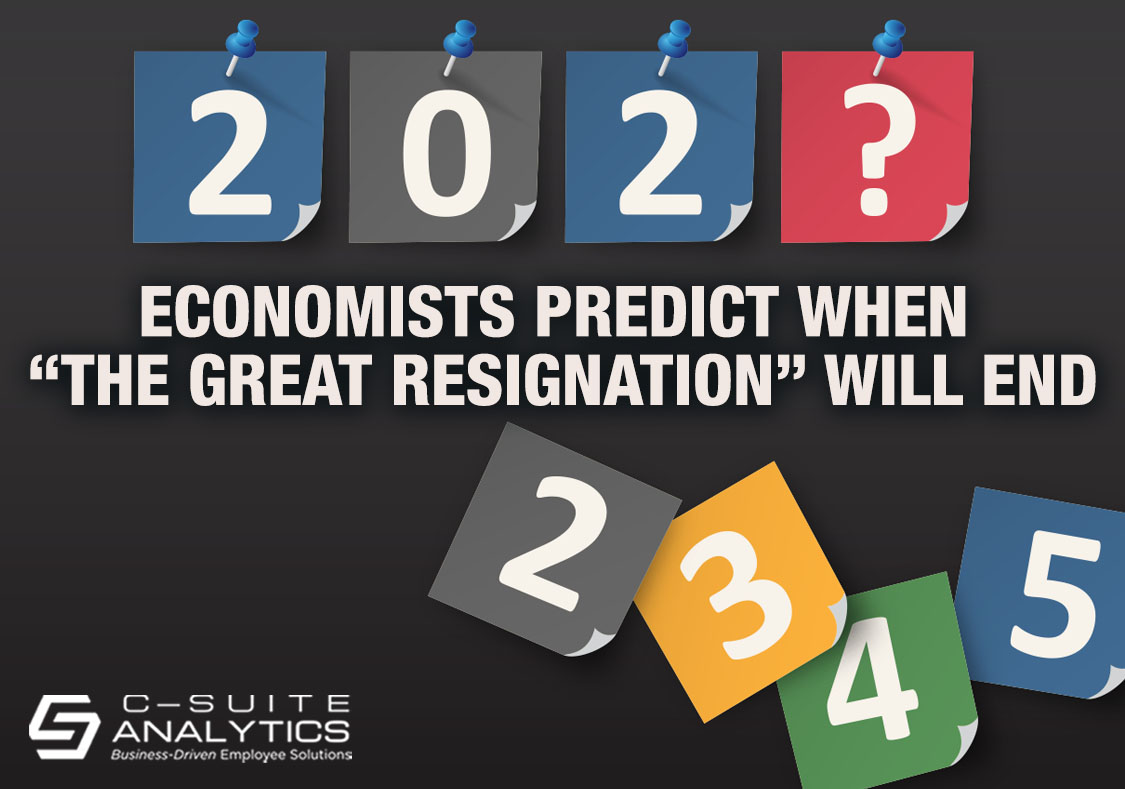Most hiring tools answer whether candidates can and will do the job, but not if they’ll stay. Learn how realistic job previews and motivational-fit interviews can improve retention from day one.
Economists Predict When “The Great Resignation” Will End

The news is in…and it isn’t good.
Last month the Wall Street Journal reported the results of a survey conducted with a large group of economists. Of the 52 economists surveyed, 22 predicted that workforce participation would never return to its pre-pandemic levels. The Journal summarized by saying this:
“Many expect the labor shortage to last at least several more years, and some say it’s permanent”.[i]
Time Magazine found a different angle on the Great Resignation, reporting just last week:
“Economists predict that the Great Resignation is only getting started, especially for Gen Z and millennial workers who are well-positioned to find new ways to earn income.”[ii]
Gen Z and millennials comprise more than half of our workforce. And since their dominance in our workforce increases each year, millennials alone will make up a full 75% of our workforce by 2025. So any prediction that their participation in the current Great Resignation period will continue to grow should send shivers through all of us. The oldest millennials turn 40 this year…meaning those generalizations that all young people are millennials or the reverse, that all millennials are young, have run their course.
As just one example, August’s Bureau of Labor Statistics’ report told us 4.3 million workers quit their jobs, the largest group being about 900,000 from restaurants, bars, and hotels. In a survey, nearly 80% of such workers indicated being hesitant to return to the restaurant industry, citing it as being “a dangerous environment, followed by low wages, difficult or unruly customers, unpredictable and/or inconsistent schedules and a lack of benefits.”[iii]
Where did they go? Driving Ubers, playing music, dog-sitting maybe. Or they took online courses during the pandemic to qualify for better jobs. The fact is that when restaurants and hotels did massive layoffs, those employees had to discover new ways to make money. And while the dog-sitting example above might be a stretch, maybe it’s not given the poverty wages restaurant workers continue to make. The reality is they didn’t have to generate much money in new jobs to replace the money they had been making.
Citing just one of their complaints from above, nearly any job is better than working unpredictable schedules…or taking flack from unruly customers. Who would want those jobs if they didn’t have to take them? And now they don’t. We learned in school about natural selection, how a species adapts to its environment for survival. The restaurant and hotel species has adapted. We forced them out and they’ve found better jobs as a result…and that result is permanent.
Remember way back in 2019 when recruiting and retaining our workers seemed so hard? The greatest take-away today is this:
The challenge of recruiting and retaining in 2019 was cake compared to what’s ahead in 2022, 2023, 2024, and 2025.
Someday soon your company will plan a “Workforce Retreat” or a similarly-themed session to address this crisis. An executive will open by saying “Our associates have never been more important” or something like that. Then she will go on to say we have to ship our products on time/provide great healthcare for our patients/retain enough call center agents to interrupt people over dinner…that type of stuff. Here are your top five items for your agenda for that meeting:
- Yes, pay matters but we can never pay our way to victory, nor can we afford it; besides, pay matters exponentially more when recruiting versus retaining.
- Want a magic benefit? Pay their student loans in full. Nobody stays for pet insurance.
- Our best retention strategy is to give all of our employees a great boss who builds trust and develops them to their potential.
- Those bosses should learn to facilitate Stay Interviews the right way…by asking five questions, listening, probing, taking notes, and solving at least one problem for each employee.
- Employee referrals stay longer, perform better, and are easier to recruit so you must gain 50% of your hires that way going forward.
The bottom line is stop waiting for this to pass because it won’t.
Hosting a workforce retreat or meeting? I’d be glad to attend virtually and free of charge to help you set the right course for retention, referrals, and real solutions. Just email me at DFinnegan@C-SuiteAnalytics.com
[i] https://www.wsj.com/articles/labor-shortage-missing-workers-jobs-pay-raises-economy-11634224519
[ii] https://time.com/6111245/young-workers-quitting/
[iii][iii] https://www.post-gazette.com/life/dining/2021/10/29/Restaurant-staffing-shortages-Pittsburgh/stories/202110310048



